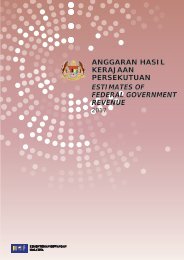WEALTH
2c0esX1
2c0esX1
Create successful ePaper yourself
Turn your PDF publications into a flip-book with our unique Google optimized e-Paper software.
MICRO FOCUS<br />
DR. EDUARDO P. BANZON<br />
SENIOR HEALTH SPECIALIST ASIAN<br />
DEVELOPMENT BANK, FORMERLY<br />
PRESIDENT AND CEO OF PHILIPPINE<br />
HEALTH INSURANCE CORPORATION<br />
(PHILHEALTH)<br />
Asia is aging faster than Europe did – this is<br />
closely intertwined with the rise of NCDs<br />
Q&A<br />
QUESTION Is the epidemiological<br />
transformation happening<br />
at an unprecedented rate in Asia?<br />
How many countries in Asia<br />
are close to realizing<br />
universal health coverage?<br />
Private providers seem to play a<br />
far greater role in Asia than in<br />
developed countries.<br />
By 2050, Asia should be far<br />
richer and certainly far older<br />
than today. How do you imagine<br />
healthcare being delivered then?<br />
That is a strong vision.<br />
ANSWER The change is fast, but as you would expect. The increase in deaths<br />
relating to air pollution, for example, has been rapid, but if the equivalent data was<br />
available I don't believe it would be different to when the Europeans began to<br />
industrialize. It is just that we have more of an idea of what people are dying from<br />
today. The main difference is that Asia is aging faster than Europe did and that is<br />
complexly intertwined with the rise of NCDs.<br />
Objectively measuring countries is part of the challenge we face. I cannot say a<br />
particular country has reached a particular level of universal health coverage<br />
(UHC). Japan, Singapore and South Korea are clearly in great positions. All I can<br />
provide for the others is anecdotal evidence that, for example, Thailand is doing an<br />
outstanding job in ensuring sick people are not impoverished, or that Sri Lanka is<br />
making great advances with limited resources.<br />
Many countries acknowledge private providers are part of life when we talk about<br />
UHC. Governments are mobilizing a lot of revenue for healthcare funds but they<br />
focus on purchasing and regulation to cover all citizens, not on service provision.<br />
The insurance funds provide incentives to both the public and private sectors as<br />
this allows for far greater flexibility and faster responses than when governments<br />
operate health facilities on their own.<br />
I believe if Asia experiences the growth projected, there will be many billions more<br />
consumers driving the personalization and commoditization of medicine. The<br />
result will be a networked, technologically-advanced care system, where a<br />
pinprick can reveal much about your health. This could be monitored remotely, so<br />
the elderly remain at home but are not a burden on families. Health workers<br />
would function as a response team whenever an emergency arises.<br />
It may sound far-fetched, but I am an optimist and it would get us away from the<br />
stepladder type of referral healthcare systems that now exist.<br />
45 Allianz • Allianz • 45



